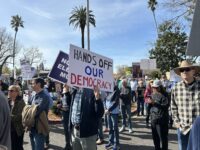 At a recent Planning Commission meeting, a proponent of a development project under review dismissively referred to project opponents as a “vocal minority.” Another said that the proposed project’s neighbors were only selfishly interested in “their own backyards” rather than the good of the community as a whole. One speaker who lives out of town even asked, “What about my rights?”, implying the opinions of neighbors were less important than his own. It’s interesting how the loyalty and devotion of people expressing aspirations about the destiny of their neighborhood is so easily characterized as something negative.
At a recent Planning Commission meeting, a proponent of a development project under review dismissively referred to project opponents as a “vocal minority.” Another said that the proposed project’s neighbors were only selfishly interested in “their own backyards” rather than the good of the community as a whole. One speaker who lives out of town even asked, “What about my rights?”, implying the opinions of neighbors were less important than his own. It’s interesting how the loyalty and devotion of people expressing aspirations about the destiny of their neighborhood is so easily characterized as something negative.
It’s easier, and perhaps more satisfying, to generate a negative “spin” rather than positive. Acronyms like NIMBY (Not In My Back Yard) have become part of the lexicon of insults used regularly to disparage those with whom we disagree. Accuracy of assignation is irrelevant in such use; the purpose of calling someone a NIMBY or member of a “vocal minority” is to shut off dialogue and serious debate, not stimulate it.
Blame and shame are the currency of aggression, often used as a substitute for education and understanding. Demonizing others is easier than study. The complexity of land-use law and regulations – the City of Sonoma’s General Plan, Development Code and related documents run many hundreds of pages – leaves many people floundering in a sea of misconceptions; it takes years to absorb and master. In an act of emotional displacement, the frequent alternative is to vent one’s ignorance and frustration by insulting others.
The opposite also happens; those who have studied the regulations and codes use their knowledge as a hammer to bludgeon neighborhood opponents into submission. This is the realm of professional experts and consultants, expensive, hired guns familiar with the ins-and-outs of land-use law and adept at wielding them in a seemingly dispassionate way. Faced with arcane and sometimes ambiguous regulatory language, the average citizen is at a distinct disadvantage, prompting simplistic outbursts of emotional frustration that others simply dismiss as “whining.”
It takes courage to speak up. For most people, the prospect of having to speak in front of a room of strangers and put themselves on “the record” is a primal fear. Accordingly, motivation and the nature of it is important. Those who are greedy, for example, only see greed at work in others; to them an individual speaking out on behalf of his or her neighborhood is viewed suspiciously as nothing more than self-serving.
Change is always challenging, and because that’s true, we’ve adopted a broad set of planning documents to provide some consistency and predictability to land use going forward. It’s impossible to perfectly predict the future, but it’s either that or abandon planning altogether and rush into the embrace of power, whim and chaos. The challenge for neighborhood residents is to stay engaged, become well informed, be alert and active. This is time-consuming and at times exhausting, but no viable alternative exists. One person often makes a difference, and in a small community like Sonoma, a committed, well-prepared group of people can sway history. The use of insult and dismissive terms will happen, but when it does it betrays weakness of argument and character.
Tellingly, as of yet we have no acronym that encapsulates the positive act of caring so deeply about one’s neighborhood that becoming an informed, activated citizen happens, but perhaps we should.





Acronyms gave a Place and a Time. Having lived all over the World, I have witnessed Neighborhoods with and without fences.
Rightsin our Local Community are not based on Income but we wouldn’t know that by the many changes in our Neighborhoods, unfortunately when a person who doesn’t live on my street complains about traffic in their neighborhood, then drives like an inconsiderate in mine naked an easy label as an NIMBY.
When people are allowed to do annoying things in their homes but then whines about what happens over the fence of their neighbors also qualify as an NIMBY.
Having beared witness to many of the author’s speeches, demonizing others seems to be a preferred tactic for his shame game against, well everything. Listen carefully to his rhetoric – full of xenophobia, protectionism, and fear mongering. If this community allows the author to force the door closed behind him, it will die a slow, sure death of all the prosperity, vibrancy and character it has.
Perhaps in the future you will display the courage to use your real name while casting aspersions on others.